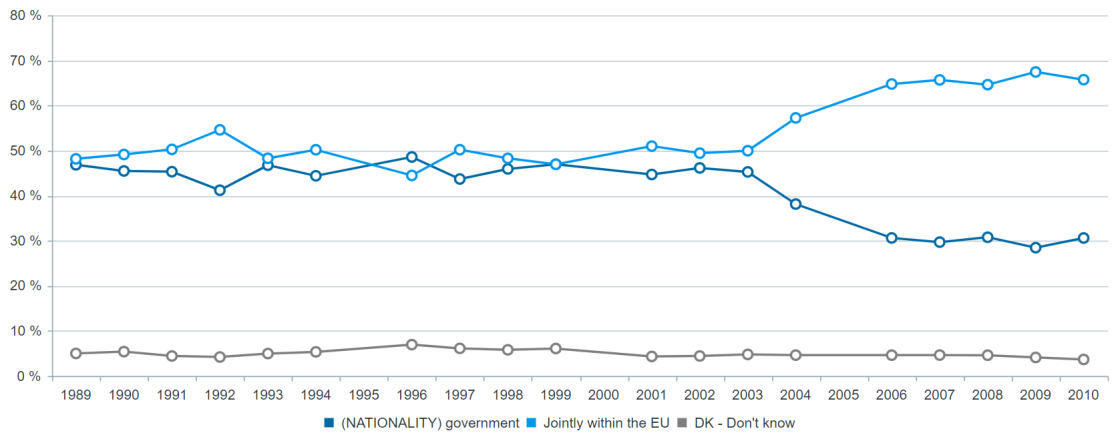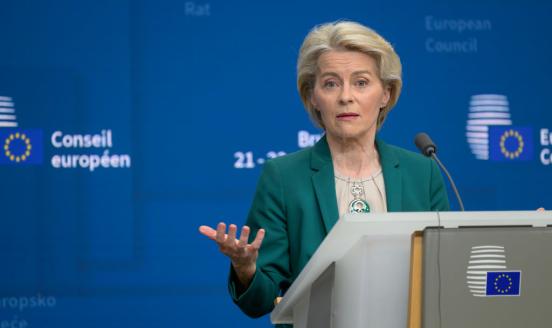Improving the efficiency and legitimacy of the EU: A bottom-up approach
The 2019 European elections promise to be a watershed moment for the EU. A recent Bruegel paper made the case for restructuring the Union’s model of g

In roughly eight months, citizens from 27 countries will be called to cast a vote in a European election that will be – without fear of exaggerating – a watershed moment for Europe.
Because of how domestic politics has evolved throughout Europe in recent years, the 2019 election will most likely be polarised between the so-called ‘sovranists’ on one side, and the ‘anti-sovranists’ on the other side. While their worldviews are far apart on most issues – including key ones, such as liberal democracy and migration – they appear to share the feeling that the current EU institutional setting leads the union to fail Europeans. It is clear, then, that European integration will be a prominent talking point in the coming months.
In a recent Bruegel paper, some of our colleagues put forward a contentious proposal to restructure the way we think about European integration and its governance. As stated by the authors, the purpose of the paper is to foster a debate on these highly relevant topics at an important political juncture for Europe. In this blog post, we take up their invitation to contribute to this critical debate. In our view this institutional-engineering, top-down restructuring approach will hardly contribute to solving the current sense of decisional impasse and regain citizen trust.
Emphasising the growing heterogeneity of views among EU countries on the direction – and even on the principle – of further integration, our colleagues conclude that “the EU has reached the limits of what it can sensibly achieve within the framework of the current treaty order”. This problem might be further exacerbated by future enlargements of the EU. Their view is that the current EU institutional structure is “too rigid to be sustainable in the long term”. On this basis, they call for a restructuring, “to prevent internal stalemate and articulate the EU political will effectively at global level”.
This new structure would be based on a ‘bare-bones EU’ built around the customs union and the single market, together with a set of vital policy matters, such as trade relations and the EU budget. Such a common base would encompass all current EU27 members and involve binding commitments to basic principles – such as the rule of law, fundamental rights, democracy as well as the EU’s institutional structure.
On top of this, for countries willing to engage in deeper integration, four ‘clubs’ would be created to deal with: i) economic and monetary union; ii) migration, asylum and Schengen; iii) security and foreign policy; iv) all remaining EU policy areas. In the authors’ view, “the real value added of establishing clubs would be to allow member countries to opt out in cases of big issues for which they might prefer to apply their own policies”, removing the “all-or-nothing approach to European integration”. Moreover, it would ensure that only countries with an active commitment to that specific policy area would be part of the club.
We share our colleagues’ feeling that something radical must change in the way the EU is currently run, and therefore we salute any well-thought attempt to devise a solution to the current institutional impasse. The rise of populist and Eurosceptic movements across Europe is the clearest indicator of this call for change. However, we disagree with the two fundamental premises on which the ‘bare-bones EU’ proposal rests – and thus with its conclusions. Moreover, while our colleagues take a top-down institutional engineering approach to solving the current problems of legitimacy of the EU, we believe that at a time when increasing numbers of Europeans already see the EU as a ‘club’ whose members are unequal in power and weight, only bottom-up approaches that put EU citizens at the centre will have a chance to succeed in restoring faith in – and support for – the European project.
The first fundamental premise underlying the ‘bare-bones plus clubs’ (BBC) proposal is the claim that the current EU institutional structure is “too rigid to be sustained in the long-term”. While not discussed in detail by the authors, this claim is based on a view that preferences of EU Member States are too different to be reconciled within a unified governance framework such as the current one.
In our view, this argument is somewhat driven by the observation of the current political situation in EU countries – in particular, certain populist governments that thrive on deep polarisation – rather than by an overall assessment of Europeans’ values and views. It is true that Europeans have different preferences for integration in different areas, but this heterogeneity (i) has actually not increased over time; and (ii) is by no means disproportionately high in the EU.
Regarding the first point, Figure 1 (below, LHS) measures the heterogeneity of views among citizens of EU countries when asked about the confidence they have in the EU. In the latest 2008 vintage, the heterogeneity was roughly the same as it was in 1990. Heterogeneity in the way Europeans look at immigration policy, on the other hand, slightly declined over 10 years. In a geographically narrower, but more thorough quantitative exercise based on a wide range of individual-level surveys, Alesina et al (2017) showed how there is more heterogeneity of views within respective EU15 countries than there is between countries.
Secondly, differences of views within integrated economic and political areas are not an exclusive woe of the EU. The US provides a clear example of how economically, socially and even culturally heterogeneous states can still bound together in a united governing framework – even a federal one, which is significantly more ambitious than the current EU setting.
A look at opinion polls at the State level is enlightening in this regard. US States tend to display significant divergence on cultural and religious traits, as well as on policy-relevant issues such as climate change and welfare. Just to mention a few examples, the percentage of adults who say that humans always existed in present form varies between a fifth (20%) in Massachusetts and more than a half (53%) in Mississippi. The share of adults who think global warming is mostly caused by human activities varies between two-thirds (67%) in DC and less than a half (46%) in North Dakota. The percentage of adults who say immigrants strengthen American society varies between 35% in West Virginia and 58% in California and the State of New York. Perhaps also as a result of these different views, the US Congress is going through a period of institutional impasse. However, scholars have not been rushing to propose a restructuring of US integration.
The second disputable premise of the BBC proposal is that the current EU institutional set-up should be completely overhauled, because it has reached its limits. But the EU integration process has demonstrated itself to be resilient even to severe setbacks. From the failure of the European Defence Community in 1954 to the Empty Chair Crisis in 1965, through the currency crises of 1972-1986 and 1992-1994 and the collapse of the ‘Snake’, to the Constitutional Crisis of 2005, the EU has successfully navigated deeply existential crises. All those crises were accompanied by a sense that integration may have reached its limits, and every time the feeling was proven wrong.
The euro-area crisis has been the last and perhaps most striking example of this. When Greece came under intense market pressure in 2009, it was even unclear whether heads of state and government could agree on the legality of lending money to an EMU member. Fast-forward almost 10 years, and the euro area has not only survived, but its ‘existential’ crisis has spurred major steps towards closer integration, such as Banking Union and the creation of the European Stability Mechanism.
While heads of state and government are pitted against each other in what appears to be an irreconcilable political contestation, government positions should not necessarily be conflated with the citizens’ views. Eurobarometer data shows that the share of Europeans feeling attached to the EU grew from 46% in 2014 to 56% in 2018. In terms of long-term trends, it’s important to note that support for EU membership is most striking among the youngest: 73% of those aged 18 to 29 have a favourable opinion of the EU, compared with a median of 58% of those aged 50 and older.
Interestingly, these pro-EU trends are also seen in countries currently headed by Eurosceptic governments, such as Hungary and Italy. Often, Eurosceptics will point out the supposedly high numbers of those that want to leave the EU in countries such as Greece (36%) and Italy (34%). When considering that roughly a quarter (26%) of Texans would be in favour of secession, the existence of these centrifugal tendencies within a federal state, after 173 years of membership, should help put into perspective these percentages in a relatively recent union like the EU. Furthermore, it is not impossible to think that common external threats such as Russian hybrid warfare, Chinese economic imperialism, the demographic challenge of Africa, not to mention that of climate change, could well push EU countries closer together.
One of the overarching arguments in support of the BBC proposal is the idea that enlargement will further exacerbate heterogeneity of views within the current union. However, future (potential) enlargements will be small, as the likelihood that big countries such as Turkey and Ukraine will join in the foreseeable future is extremely low. If enlargement will be about closing the Balkan ring, then we might well foresee an increased entropy around the table, but hardly a major increase in heterogeneity: Montenegro’s population is 0.14% of the EU27, Serbia 1.96% – and so on. The enlargement in 2004, carried out within the existing framework, appears a potentially much larger shock. In any case, if the conclusion were reached that the current institutional setting was not compatible with enlargement, we would rather resist the latter than revolutionise the former. Surely, alternative ways to manage economic relationships and keep neighbours engaged could be found – as also indicated by a subset of the aforementioned Bruegel colleagues in their proposal for a continental partnership between the EU and the UK following Brexit.
Premises aside, it is not clear to us how policies can be clearly separated in different groupings/clubs, especially in the new world order in which we live. From the Iran deal to the containment of China’s expansion, US president Donald Trump is using economic policy (e.g. tariffs, the international role of the dollar, the global predominance of the US financial system) as an instrument of foreign policy. Likewise, China’s Belt-and-Road investment initiative has profound foreign policy ramifications. Failing to recognise that policies cannot be easily compartmentalised, a ‘BBC EU’ would likely be even more unprepared for these challenges and get the short end of the stick – thus reinforcing, rather than taming, Eurosceptic tendencies. The authors foresee cohesion of the clubs through the shared institutional and legal structure, but we fear that this is too weak a base to be effective.
For too many Europeans, Europe is already a ‘club’. The North-South divide and the ensuing narrative that emerged from the euro-area crisis is a clear example of that. A rampant increase in Euroscepticism across the board ensued, as we have witnessed in national elections. We believe that the EU needs to drastically change this perception.
But restructuring European integration in an explicit club-based structure would hardly serve this purpose. The key starting point to improve the efficiency and legitimacy of the EU should be a reflection on the question of where the union’s added value comes from. Issues such as migration, terrorism, economic globalisation, and climate change are the most obvious cases where integrated decision-making appears to be superior to uncoordinated pursuit of national interests.
This also seems to be in line with the expectations of European citizens, who have always been strongly in favour of EU policy action on issues such as environment protection (above 70%), foreign (67%), and migration policy (68%). Interestingly enough, these percentages have remained stable over more than 15 years and the share of people supporting joint decision-making on migration has increased from 50% in 2002 to 68% in 2018 – notwithstanding the refugee crisis (see Figure 2).
Europeans have recently become supportive of joint decision-making even in the field of defence – traditionally a carefully-guarded national prerogative. Compared to the early 1990s, when Europeans were split 50-50 on the issue, the share of people who think defence should become an area of joint decision-making is up to more than 70%, in 2018 (Figure 3).
Figure 3. Support of EU citizens for joint decision-making on defence

Source: Bruegel based on Eurobarometer.
While these swells of support do not necessarily imply that agreeing solutions to these issues will be swift and smooth, we would take them as a hint that – at least at citizens’ level – there is a sense of direction towards a closer union.
This is the key prerequisite for joint decision-making. The rest, we would contend, should be left to politics, which in the end is about aggregating preferences. As such, perhaps what we need is better politics within the current framework, rather than a different institutional setting altogether.
Not by coincidence, the aforementioned policy areas are also those that, according to the Eurobarometer, concern European citizens the most – and on which the EU has failed Europeans, according to the prevailing Eurosceptic narrative. If the EU were able (i.e. could be enabled) to deliver on these issues, its key role would be more easily acknowledged by citizens, and the intellectual basis of Euroscepticism would be weakened accordingly. This is the virtuous cycle we should seek to ignite in Europe.
To do so, the EU should invest more effort in those policies and actions that establish a direct link with citizens, so that it is better able to act on their concerns. A functioning single market, a state-of-the-art Galileo satellite system, a globally admired European Research Council (ERC) grant – these are all important achievements, but hardly directly tangible to the average EU citizen. On the other hand, smaller potatoes (in financial terms) like the Erasmus programme or ‘free roaming’ are prominently featured when people are asked to list positive things the EU did for them.
In some areas, such as competition policy, the EU is universally accepted to be extremely effective and efficient. Multibillion-euro fines of tech giants attest to this. We would take these positive examples as a starting point for discussion. What made competition policy successful is arguably the fact that a clear competence was assigned to the EU in the field, which is also the argument made by our colleagues. The fostering of a clear assignment of competences in the areas where EU coordination is most needed and wanted by citizens is a starting point to fix the current EU institutional setting; there is no need to engineer an even more intricate system of secretariats and clubs, which would provide even less of an answer to Henry Kissinger’s dilemma: “Who do I call if I want to call Europe?”.
When our colleagues state that qualified majority voting cannot solve Europe’s problems because it will eventually disgruntle out-voted Member States, we would agree; in a way, what the authors are implying is that we have probably reached the limits of what can be achieved by an institution that was originally designed as an international organization, with limited direct political backing. Surpassing unanimity implies that the legitimacy of the decisions is no longer channelled through the election of the national government. As such, one needs a more politically legitimate centre.
This is the reason why, for us, the only solution to the current EU integration impasse will go through European citizens. Politics is bottom-up, and not (only) institutional engineering and top-down treaty change.
In other words, we would favourably see a move beyond the Lisbon Treaty, but only if it were functional to increase the level of EU integration in crucial transnational issues such as migration or climate change, and if it were backed by an EU-wide discussion that actively engaged European citizens in all 27 Member States.
Of course, the standard criticism of such a prospect is to mark it under the “Political Union” heading, and remark how it will not happen any time soon. And yet, we find an array of small but encouraging signs in this respect. The euro-area crisis led to a broader understanding among citizens that what happens in one country affects us all. Moreover, there is a widespread awareness that what happens in Brussels does not only affect ‘the shape of bananas’, but fundamental policy matters such as data protection, copyright, migration, climate change, and euro-area bail-out packages.
For the first time since 1979, it looks like some transnational parties – Diem25 or Volt, for example – will be running in the European elections on a shared programme, rather than in the classic aggregations of political families. New grassroots initiatives based on the EU are developing and, in this respect, for those of us who have lived in the UK where no EU flag was ever to be seen, even the ‘stop Brexit’ rallies displaying the blue-starred flag surrounding Westminster are eye-catching.
Of course, different national governments will have different views on many of these issues. But this – as we can see from our past – need not be an obstacle towards more integration. From the private to the public sector, evidence is piling up that diversity of backgrounds and views is to be seen as a strength, even when it comes with fiery discussions and disagreement. The EU’s motto is ‘united in diversity’, but towards an ‘ever closer union’.



